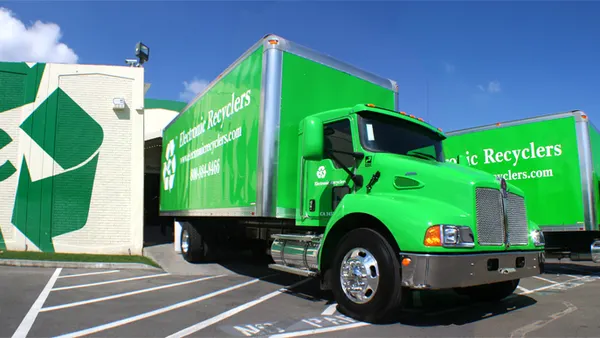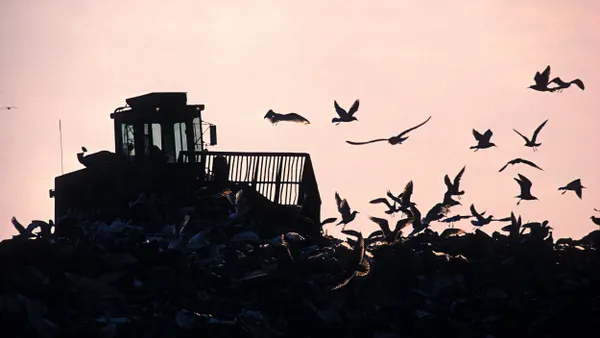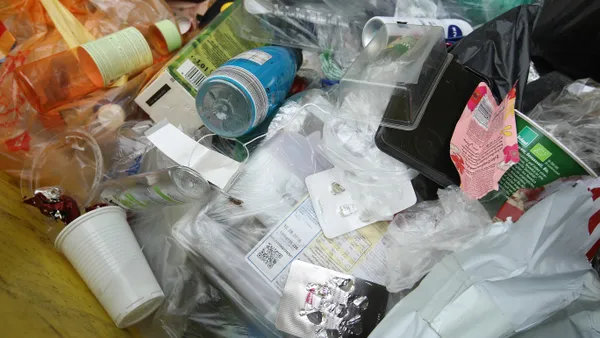UPDATE: July 30, 2019: Delaware Gov. John Carney signed two pieces of legislation aimed at addressing statewide litter on Monday, according to a press release. HB 130 will ban the distribution of single-use plastic bags by 2021, while a substituted Senate bill will increase penalties for unlawful dumping and create a Litter Investigation and Enforcement Fund.
"We live in a beautiful state. We should keep it that way," said Gov. Carney in a statement. "One of the best ways we can take pride in our communities is to keep them clean ... These new laws will help us protect Delaware communities from litter, protect our environment, and protect Delaware wildlife."
Delaware is the latest in a string of states — including Connecticut, Oregon, New York, Maine and Vermont — to pass single-use bag bans this year.
Dive Brief:
- Delaware Gov. John Carney has indicated he will sign plastic bag ban legislation passed by the state legislature earlier this month. "We know that very few plastic bags are recycled and many end up as litter in our communities. I look forward to signing this legislation," Carney said in a June 6 statement.
- The final bill (HB 130) bans the distribution of single-use plastic bags – with multiple exceptions – by Jan. 1, 2021. This will apply only to stores with at least 7,000 square feet of retail space, or stores with three or more locations that have at least 3,000 square feet of retail space in the state.
- The Delaware legislation does not require a fee for the use of paper bags, but stores can make them "available for no cost or charge any price at their discretion." It does set more specific requirements for what can be defined as a plastic or fabric "reusable" bag – including details about volume, washability, toxicity and durability.
Dive Insight:
Depending on when Carney signs this bill, Delware could become the fourth state with some form of plastic bag policy.
This would follow California, New York (which recently passed its policy) and Hawaii (which has a de facto statewide ban via county ordinances). In addition to the usual concerns around land and marine pollution, the bill also cites the potential for plastic bags to "clog the machinery in recycling Materials Recovery Facilities causing daily delay and expense."
Plastic bag legislation is pending final approval via various avenues in states such as Connecticut, Maine, Oregon and Vermont. Governors in some, if not all, of those states are also expected to sign this legislation in the near future.
The Delaware law would build on existing language that required plastic bag recycling at retail stores. That policy will remain in place, with plans to include plastic film as well, while expanding the state Department of Natural Resources and Environmental Control's authority to the broader issue of distribution.
Similar to the approach in New York, Delaware's bill does allow room for local governments to do more. One provision will allow municipalities with populations of 50,000 or more to apply the requirements to stores with more than 500 square feet. Wilmington is the state's only city to pass that threshold. Rep. Gerald Brady, HB 130's primary sponsor, represents Wilmington.
While Carney has gotten behind waste issues recently, launching a new "Keep DE Litter Free" campaign last month, this will not be as broad as other current or pending regulations in other states.
Banning thin plastic bags without taking a similar approach to paper – or at least mandating a fee for paper – is seen as a potential recipe for higher consumption of thick plastic bags. The inclusion of multiple exemptions for meat, produce, dry cleaning and other use cases has also started to become less acceptable in some environmental circles. Palo Alto, California recently passed legislation banning the use of plastic bags even in such cases.












